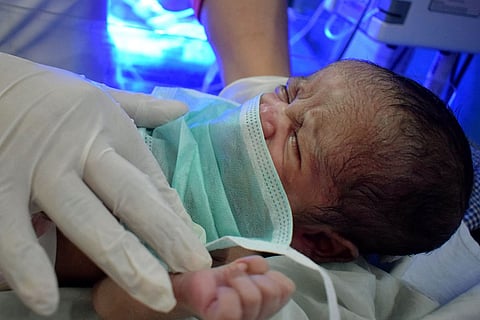

Since the lockdown began in Tamil Nadu, there have been over 500 cases of children below the age 12, who have been infected by the coronavirus. And while some remain asymptomatic, other minors have been forced to deal with the illness and its symptoms including body pain, severe cough and breathlessness. Speaking to TNM, regarding the treatment of these young patients, authorities from private and government hospitals explain that dealing with children who have the virus is a process vastly different from handling adults with the virus.
"When children are between 7 and 14 they are able to comprehend the situation to an extent and follow instructions. The challenge there is to ensure that they eat and have enough energy to fight the virus," says Dr. Sadagopan, the Medical Superintendent of the Coimbatore Medical College and Hospital. "But our real challenge is dealing with children below the age of 7. If they are symptomatic they won't be comfortable and will be very non-cooperative. They won't understand why there is a change in their environment and why they are surrounded by new people," he adds.
In such cases, says the Superintendent, the children refuse to listen to medical staff.
"Children that young will only go by what their parents say, so we are at a disadvantage. But in most cases, over 90% of the time, the parents are also infected even if they don't exhibit symptoms. So we keep the child and parent in the same ward to ensure effective treatment," he says. "In cases where parents are not infected, the nurses play a vital role, where they are focussed on the child and ensure that the patient is comfortable with them. What we also do is, we put children with other children in the ward. There will be a distance of four metres but the visual company enhances cooperation from what we have seen," he adds.
For doctors across the state, handling children is particularly tricky because symptoms of the virus could degrade their mood, making them unpredictable and non-cooperative.
"In certain cases, when their fever is too high and they become restless we give mild sedatives that are approved for children. This helps them get the rest their body needs. Otherwise they are bound to cry and tire themselves out, making their symptoms worse," says Dr Sadagopan.
When it comes to the treatment itself, doctors say that most of their work involves supportive care.
"We will monitor their breathing and lungs and also ensure all their vitals are okay. We explain to them what exactly we are doing to mitigate fear. For instance if we need to introduce an intravenous fluid line we tell them exactly what they will feel and about the process," say Dr J Rajkumar, a paediatric infectious diseases specialist from Gleneagles Global Health City. "As far as medication goes, we have seperate ones for children," he adds.
The Dean of Kilpauk Medical College Dr Vasantamani, however, points out that children are largely unaffected by the virus across the world. As per data collated by the worldometers, there have been no fatalities between the ages of 0 and 10, while the death rate between 10-19 is 0.02%.
But Dr Vasantamani advises caution when it comes to newborn children.
"We allow for new mothers to continue breastfeeding the children, even if they are infected, so that they pass on antibodies," she says. "Once this is done, the child is taken into the care of the nurse. We have to ensure that the child is not infected by the mother," she adds.
According to the World Health Organisation (WHO), "transmission of the COVID-19 virus through breastmilk and breastfeeding has not been detected. While breastfeeding, a mother should still implement appropriate hygiene measures, including wearing a medical mask if available, to reduce the possibility of droplets with COVID-19 being spread to her infant. Mothers and families can be advised that among the few cases of confirmed COVID-19 infection in children, most have experienced only mild or asymptomatic illness. In contrast, there is high quality evidence showing that breastfeeding reduces neonatal, infant and child mortality including in high resource settings and improves lifelong health and development in all geographies and economic settings."